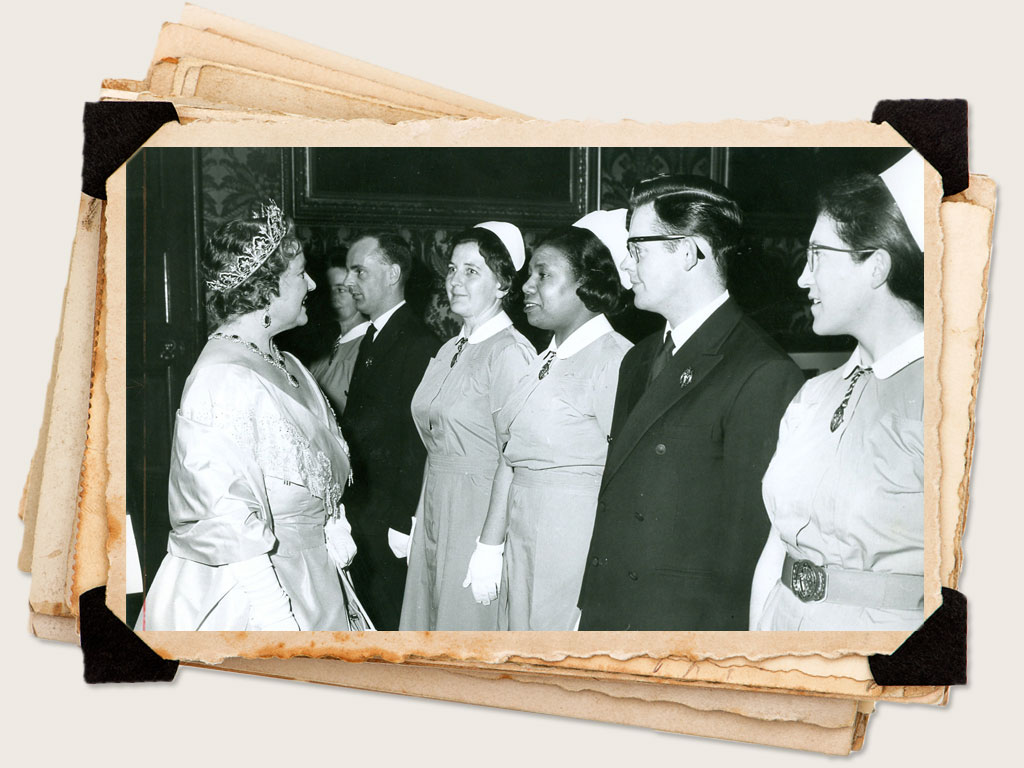In the early months of 1947 we saw the introduction of the Male Nurse with the Queen’s District Nursing Association. It was an experiment. There were in Great Britain four of us young men, setting out to prove the value and efficiency of our sex in this new sphere of nursing.
Prior to commencing duties I was naturally keenly interested and filled with conjectures as to the sort of reception I would receive, first, from the general public and secondly from my female counterpart. I place my female colleague second because I anticipated, and expected, a cordial welcome from her, in view of her familiarity and acceptance of the male nurse in general hospitals, fever nursing and mental nursing. With certain exceptions the old prejudice against males as nurses has disappeared from the nursing profession.
District nursing was an adventure to us ‘early pioneers’ as we were amusingly called…The question was, did prejudice really exist in the public mind? It certainly does not as far as the Hospital Male Nurse is concerned, and I have found no evidence of prejudice during my District Nursing career. Certainly I have heard some women relatives of patients express doubts as to the desirability of males nursing females, but without exception I have been accepted gratefully and unreservedly into every home where I have had occasion to carry out nursing duties. Some have, indeed, in my hearing, thanked God for a Male Nurse, not out of any disrespect for our Queen’s Sisters, but ‘because the poor patient is so heavy to manage for any woman.’
…Those of us who were married had, provisionally at any rate, to leave our homes, wives and families and enter a new environment. It meant finding lodgings, a difficult problem anywhere today. It meant reduction in salary while training, and at the same time, keeping a family in one part of the country and oneself in another, a nightmarish problem. This particular problem of accommodation was largely the cause of the slow response to early recruitment of males at the inception of the experiment. Difficulties of all kinds were greatly reduced by the friendliness and assistance accorded us by our local Secretary, Superintendent and nursing colleagues.
I will always remember the cordial welcome I received on my arrival at Leicester on March 31st, 1947. My Superintendent, Senior Nurse and colleagues very soon put me at ease and made me feel a member of a grand family. I was permitted all facilities in the Nursing Home. It was well equipped with an excellent lounge, reading room and dining room. These were pleasantly furnished and always richly decorated with flowers. We had a beautiful piano and every encouragement to continue with our hobbies was given us during our off-duty hours, and we were rarely idle. In my training school we had, apart from our Superintendent, six nurses, and were always busy either with music, study, reading, sewing, knitting or gardening. Leicester District Nursing Homes all have delightful gardens.
The day following my arrival I was taken out by the Senior Nurse and shown the technique of Queen’s Nurses. Nursing in the home, I found, was very different from nursing in a hospital, where the nurse has all the nursing facilities and equipment at hand. There is an art of improvisation to be learned by the District Nurse. Much of the Queen’s Nurses’ time and energy is absorbed by cycling from patient to patient. The Male Nurse covers more ground at present than the Queen’s Sisters, because he is only permitted to nurse male patients. This means, that to employ him fully, he nurses nearly all the male patients within the orbit of the Nursing Home; whereas, the Queen’s Sister, in the cities, covers particular areas. My average daily travelling distance is twenty-one miles.
How am I accepted by the general public? When once it is realised I am not the insurance agent or an intruder, I am always welcomed. After my first visit with its attendant shock to the householder, who always gives me a look of interrogation – (for I wear no uniform at present to announce my profession, until I enter the house when I change into a white jacket) I am always accepted without comment. Of course I am often asked how long Male Nurses have worked on the district? Am I to be addressed as Sister or Brother or Nurse, or how? Many persist in addressing me as ‘Doctor’!! Do I attend females? Do I attend maternity cases? There seems to be surprisingly little prejudice against Male Nurses, in fact, surprise has more than once been expressed that we nurse only males, especially in view of some of the heavy female cases.
…During my first six months’ training as a Queen’s Candidate, I was surprised to find how comprehensive and wide the educational syllabus is. I thoroughly enjoyed my lectures and visits. The lectures included medicine, hygiene, child welfare and management, poor law, charitable societies, local government, diet and Health Insurance, among many others. Visits were made to a dairy where the pasteurisation processes was in progress, to the city sewage works, a Mental Deficiency Home, a Nursery School, a School Clinic, a Child and Maternity Clinic, a large factory (where we were conducted round by an Industrial Nurse), and a Psychiatry Clinic. These were just a few of our varied visits. A complete half day was spent with a Health Visitor.
From my personal experiences, I am sure that the Male Nurse henceforward will become an integral part of the QDNS, and that he will, within a few years, be as fully recognised for his ability and sympathetic understanding as the Queen’s Sister. The experiment, in Leicester alone, has been so successful, that two more Male Nurses have been employed and a vacancy exists for one more. District Nursing presents a magnificent opportunity to the Male Nurse to popularise himself and of proving his intense value to the community.
D. J. Gillett
Male Nurse
